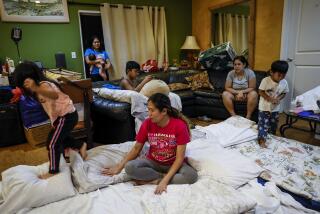Clinton Expands Drive to Help Children
Pledging to make government child-care centers “models” for the nation, President Clinton on Tuesday directed all federal day-care facilities to obtain independent accreditation based on accepted safety and quality standards.
At the same time, Clinton called on Congress to address a “crying unmet need” by acting on comprehensive legislation to boost the affordability and accessibility of child care for preschoolers and school-age children across the country.
“We should not let the calendar get in the way of the need for urgent action,” Clinton told a group of several hundred people in a community college gymnasium in this blue-collar, New England coastal city. “We can pass the child-care reforms and we can fund them.”
The comments reflect a new effort by Clinton to increase pressure on the Republican-controlled Congress to act on his policy initiatives despite a relatively short legislative calendar and a preoccupation with political and personal controversies. At several points in his speech, Clinton noted that Congress has only 70 scheduled working days left this year.
“Do everything you can to send a clear and unambiguous signal that you do not want the election year to be a relaxation year, you want it to be a legislation year for the children of this country to make them stronger in the new century,” Clinton said.
The president is pushing a legislative package of child-care subsidies and tax credits that would cost $22 billion over five years. He has also signaled his willingness to endorse similar measures introduced by both Republicans and Democrats in Congress.
In addition to advancing his child-care agenda, Clinton again urged Congress to pass legislation to reduce teen smoking and raise the price of cigarettes by up to $1.50 per pack.
Passage of the tobacco legislation is critical to Clinton because many of the policy initiatives in his budget--from the child-care subsidies to funding for smaller school classrooms--would be financed by additional cigarette tax revenues.
The executive directive announced by Clinton directs all federally run child-care centers to obtain, by 2000, accreditation from recognized nonprofit, nongovernmental professional organizations that inspect facilities to ensure they meet standards of safety and quality.
The federal government operates 1,024 child-care centers--788 of them by the military and the rest by civilian agencies--serving a total of 215,000 children. Currently, 76% of military facilities and 35% of nonmilitary facilities have been accredited, according to Jennifer Kline, special assistant to the president for domestic policy.
Although federal facilities represent only a fraction of all child-care centers, Clinton hopes the accreditation campaign will spur other day-care providers to follow the government’s lead. Currently, 7% of day-care facilities nationwide are accredited, Kline said.
The directive includes provisions to ensure that federal day-care centers satisfy existing requirements to conduct background checks on all employees.
Before the speech, Clinton toured a child-care center at the Housatonic Community-Technical College in Bridgeport. He sat on a small chair, and helped two preschool girls with a computer program. He talked with other children about watching “Bill Nye the Science Guy.” And he graciously accepted a quilt that had been hand-decorated by the children.
Later, Clinton attended the first of two fund-raising events, a lunch in Westport, Conn., that was expected to raise $350,000 for the Democratic National Committee.
He then traveled to Cincinnati for another DNC fund-raising effort at the private residence of Stanley Chesley, a lawyer who has a financial stake in congressional approval of a proposed national tobacco settlement.
Chesley represents plaintiffs who have sued tobacco companies, and has testified before Congress in favor of the settlement. He and several other attorneys attending the fund-raising dinner stand to earn millions of dollars in fees if the tobacco settlement wins congressional approval.
White House officials disputed suggestions that Clinton’s participation in the fund-raiser represented a conflict of interest.
The dinner “has nothing to do with the legislation,” White House spokesman Barry Toiv said. Chesley, he added, “is a longtime supporter of the party and a longtime supporter of the president.”
The DNC expected to raise $500,000 at the dinner.
More to Read
Start your day right
Sign up for Essential California for news, features and recommendations from the L.A. Times and beyond in your inbox six days a week.
You may occasionally receive promotional content from the Los Angeles Times.






